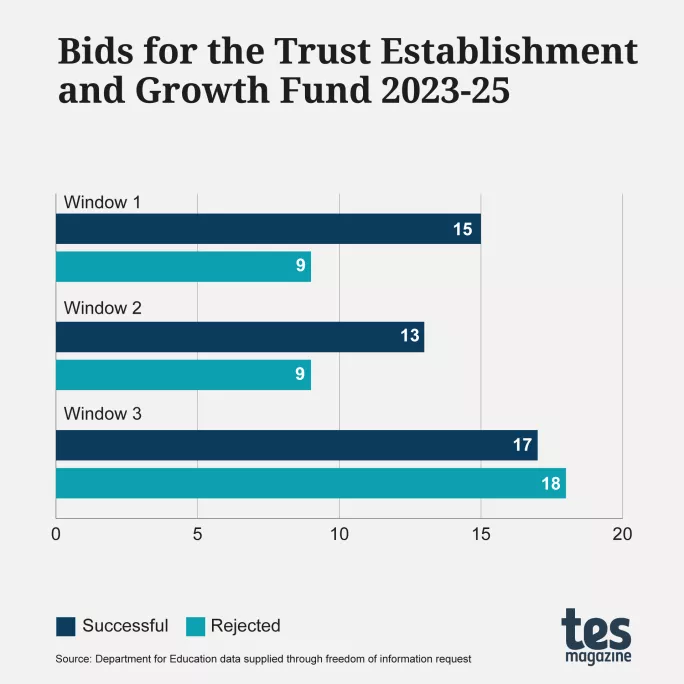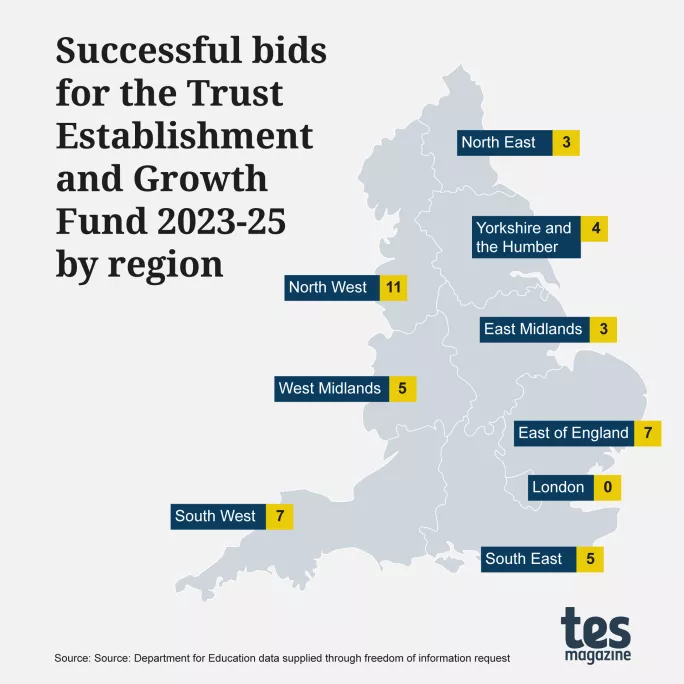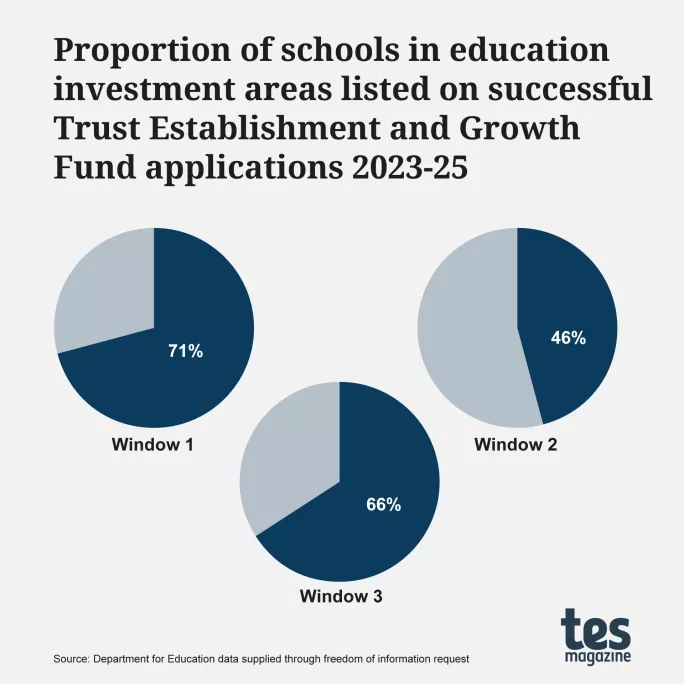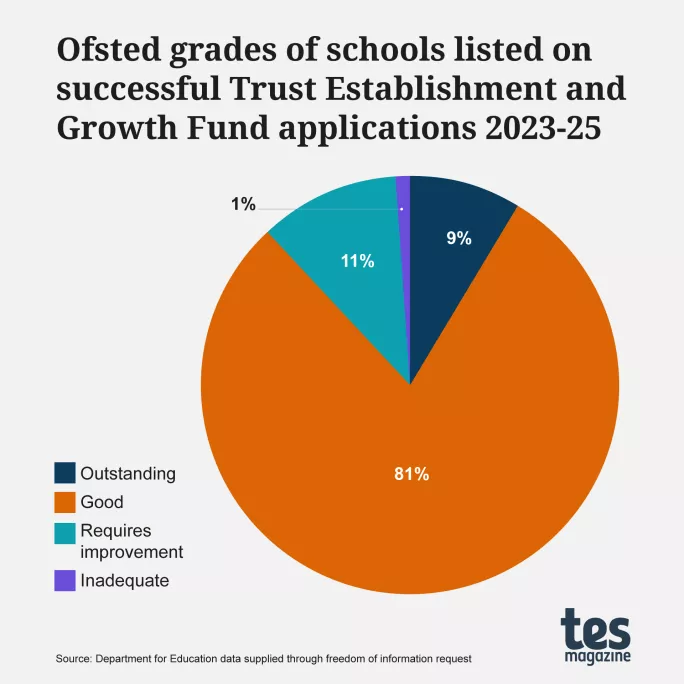Plans for new MATs risk ‘collapse’ after grant cut

The removal of a “vital” funding pot for setting up new multi-academy trusts could lead to the “collapse” of plans to fill gaps in provision, leaders and experts warn.
The Trust Establishment and Growth Fund (TEG) was one of the pots of money available to academy trusts that was cut in October before the Budget.
Schools and trusts that received this funding say it was “crucial” in setting up new MATs and addressing gaps in their local area.
Now leaders fear that the cut will stop schools from setting up new MATs that could support struggling schools and boost inclusivity. They are also worried that it will hinder the creation of more primary-only trusts.
Meanwhile, schools that won TEG funding fear that a shift in priorities under the Labour government now means that projects that have been months or years in the making may never get off the ground.
Funding to launch new MATs
TEG was available to support the initial stages of setting up a new MAT or to expand an existing MAT into a new area. Schools and trusts could get up to £50,000.
“The TEG funding was vital. Unless you are a massively established trust, it was crucial to us setting up something new,” says Susan Davis, head of Birkby Junior School in Kirklees, West Yorkshire, which was successful in winning TEG funding, with other schools, to launch Industrious Education Trust.
“I think we’ll be the last tranche of anything new,” she warns.
There were 45 successful bids for TEG, which amounted to more than £2.1 million, from 2023 until the fund was cut along with the Trust Capacity Fund (TCaF) this year, according to data obtained by Tes under freedom of information (FOI) legislation.
TEG 2023-25 had four rounds of funding, called “windows”, that schools and trusts could apply for. Tes received FOI data for windows one to three, and the fourth one was cancelled in October.

“There will be groups of schools that have spent six months to a year talking with other schools about coming together into a MAT,” says lawyer Emma Swann, head of academies at Harrison Clark Rickerbys.
“These schools invested significant time and effort into planning, and now face the very real risk of these plans collapsing.”
The last round of funding was pulled by the new Labour government, which has moved away from the former administration’s push for academisation.
“If the government is saying, ‘We don’t really care about structures,’ it doesn’t really make much sense to go out making lots of new MATs,” says Mark Blackman, director of education consultancy Leadership Together.
“But there are still people in the system who want to do that. We’re now not trying to achieve a structural aim, we’re trying to achieve an improvement aim.”

Despite the Department for Education moving away from MATs as the only answer to school improvement, several groups of schools that made successful TEG bids say they are now using the money to set up local and regional MATs that will address local needs.
For example, Wyke Sixth Form College in Hull was successful in receiving TEG funding in the hope of creating a MAT with five local schools in East Yorkshire, Hull and North Lincolnshire.
“It’s not about growth for us,” Paul Britton, headteacher at Wyke, tells Tes.
“This is the third most deprived place in the country, where kids face serious barriers. We are really keen to be able to work on how we build them up throughout their entire education journey and do something good for the region,” he says.
Wyke’s trust plans to provide provision for children from age 3 to 18, and to create local pastoral teams and family engagement officers, who will follow children throughout their education.
- School funding: Where academy trust capacity funding goes
- Academies: Trust capacity funding cut with ‘no plans’ for future rounds
- Analysis: How the conversion grant cut will hit small trusts and converters
Meanwhile, Mosaic Partnership Trust, which won TEG funding for its proposal to set up a MAT in South Gloucestershire with 19 primaries, built its trust model, including its curriculum, around inclusion and diversity, says CEO Andrew Best.
And alternative provision (AP) setting Everton Free School in Liverpool, which had received an “outstanding” rating from Ofsted, plans to address a flagged need for trusts with AP expertise and understanding of the local area in the North West by becoming a MAT alongside two more APs and three primaries.
Which schools got TEG funding?
An average of 70 per cent of TEG funding in 2023-25 went to projects aiming to set up a new MAT with at least one school in an education investment area (EIA), or to expand into an EIA, our data shows. Supporting schools in EIAs was one of the aims of the fund.
The schools listed on applications for the strand of funding targeted at EIAs that were successful had a quarter of pupils receiving free school meals, on average. This is in line with the proportion of children estimated to be eligible for FSM nationally.

Back in March 2023, under the previous government, the DfE published trust development statements setting out how trust provision needed to be developed in each EIA.
In South Gloucestershire, for example, the trust development statement highlighted a need for a primary-only trust - particularly one that could work with rural schools in local communities.
Mr Best says Mosaic, which has now opened as a MAT with an initial 12 primaries, feels that it has a “moral duty” to take on smaller village schools in the trust, and hopes to be able to provide a home for more.
Taking into account the removal of the academy conversion grant from January, fears have been raised in the sector about smaller struggling schools with tight finances getting left behind.
Mr Best says it is “a shame” that other areas might not have the opportunity to set up a MAT where they see a gap in provision because of the removal of the funding.
In Kirklees, the trust development statement flagged a need for two to three additional trusts with primary expertise - particularly with “experience of supporting small schools”.
Salendine Nook High School Academy in Kirklees subsequently applied for funding to form a MAT with five primary schools, as did a group of maintained primary schools in Kirklees hoping to form Industrious Education Trust. Both were successful.
Ms Davis says it feels like the “last opportunity” to create something new in Kirklees.
“It was really significant for us. Pulling these funds makes things increasingly more difficult,” she adds.
“If you’re secondary-led then there’s a little bit more flexibility in terms of backroom staff and finances to support planning a new MAT than if you’re primary-led.”
Successful schools tell Tes they have used the funding to bring in project managers to help to develop their plans where there was not capacity for this in their schools.
They have also put the money towards legal costs and upskilling leaders, and to go through a proper consultation process with local schools.
As part of the process for setting up a new MAT, a school - when it is ready - takes its proposals to an advisory board, ahead of official approval from a regional director.
‘We might not be able to deliver’
But for some of the schools that won TEG funding before the election, the apparent change in attitude towards academisation under Labour has slowed down the process of getting set up as a MAT.
Many of the winners were waiting until after the election to get formal approval for their MAT and in some cases they are now worried their projects may not get off the ground at all.
Wyke applied to become a MAT in April, but has not received a decision yet. It is waiting for a DfE decision on privately-held loans for capital projects.

“We had a good and very helpful £50,000 that really accelerated our project earlier this year and now I’m worried we might not be able to deliver on what we promised because no one seems willing to make decisions,” says Mr Britton.
He adds that it would be helpful for the new government to clarify whether it wants any new MATs.
“We’ve invested a lot of resource and time into this project, and there is a risk - if we don’t get clarity - it may not come to pass,” he says.
Wyke has created fixed-term and leadership positions to take the project forward. Mr Britton says it would “cause us a lot of problems on what to do with those” if it is not able to move ahead by the end of the academic year.
‘Gap in support’ for schools
Leora Cruddas, chief executive of the Confederation of School Trusts, says: “The decisions to cancel TEG and TCaF will leave a gap in support for the schools and areas that need Labour’s opportunity mission the most.”
Of the schools listed on successful TEG applications, 12 per cent were rated by Ofsted as “requires improvement” or “inadequate”.

Many of the trusts that were successful in receiving TEG had also applied for, or hoped to apply for, TCaF, to help build capacity once the trust was set up.
Salendine Nook had applied for window 4 of TCaF. Tes previously reported that trusts were left waiting for months for decisions before this round of funding was cancelled.
Salendine Nook’s financial plan did not hinge on the funding, but as the only secondary in its new MAT, it will now have to absorb more of the initial costs as the trust develops a leadership team.
“Whilst it is not impossible, it will almost certainly be harder for other schools to grow into MATs without the availability of funds such as TEG and TCaF,” says Virginia Wood, business manager at Salendine Nook.
A previous Tes analysis shows that 20 new MATs were approved by regional advisory boards in 2023-24. Meanwhile, 33 mergers were approved.
The DfE, under the previous government, had been pushing trust mergers, particularly for smaller trusts and single-academy trusts.
Labour has not set out any expectations for the trust landscape, but experts have predicted that some trusts, particularly smaller or primary-only ones, will be thinking about mergers.
“I think the DfE are very much now in the space of only approving new MATs if there are no other viable alternatives,” Mr Blackman says.
“We’ve all seen schools that have bounced from trust to trust - a structural answer isn’t necessarily a solution.”
He adds that now grants such as TEG and TCaF, which worked on strict spending periods within a financial year, have been cut, any new money targeted at school improvement will need to be more flexible.
Tes understands that the DfE will continue to process applications to form or merge with high-quality trusts, or for schools that wish to convert or transfer to high-quality trusts.
A DfE spokesperson said: “We value the role academy trusts play in our school system but have had to take action to put government spending back on to a sustainable footing and fix the foundations to deliver change.
“We will continue to support high-quality trusts to use their collaboration and leadership to help deliver exceptional results for children and young people, including those in disadvantaged areas.”
For the latest education news and analysis delivered every weekday morning, sign up for the Tes Daily newsletter
Keep reading for just £1 per month
You've reached your limit of free articles this month. Subscribe for £1 per month for three months and get:
- Unlimited access to all Tes magazine content
- Exclusive subscriber-only stories
- Award-winning email newsletters
topics in this article



